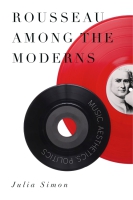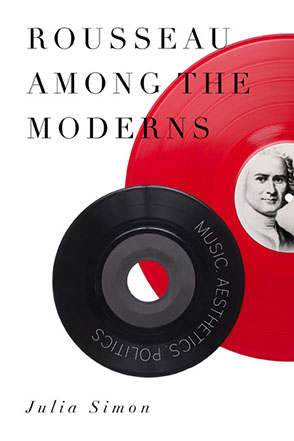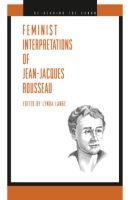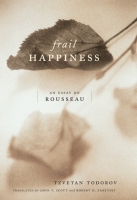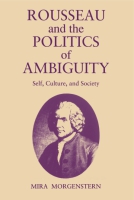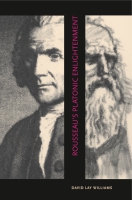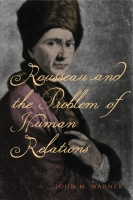Rousseau Among the Moderns
Music, Aesthetics, Politics
Julia Simon
“The research in Rousseau Among the Moderns is excellent. The book is clearly written and deploys an interesting and puckish sense of relation to present-day music. It is an important contribution to Rousseau scholarship and brings together a lot of material that has been published in very different venues.”
- Description
- Reviews
- Bio
- Table of Contents
- Sample Chapters
- Subjects
“The research in Rousseau Among the Moderns is excellent. The book is clearly written and deploys an interesting and puckish sense of relation to present-day music. It is an important contribution to Rousseau scholarship and brings together a lot of material that has been published in very different venues.”
“Julia Simon's Rousseau Among the Moderns is a fabulous book that adds something new and important to the field of Rousseau studies. In the past two decades or so, a number of studies have attempted to bridge a long-standing critical gulf between Rousseau's literary works and his social theory, Simon's included. But hers is perhaps the first study to integrate what are already interdisciplinary readings of works such as The Social Contract, the Discourse on the Origin of Inequality, and Julie with Rousseau's considerable writing about music.”
Julia Simon is Professor of French at the University of California, Davis.
Contents
Acknowledgments
A Note on the Text
Introduction
1 Performance, Rhythm, and the Constitution of Community
2 Singing Democracy: Music and Politics
3 Rameau and Rousseau on Absolute and Relative Value: The Theory/Practice Problem
4 Folk Music: Authenticity, Primitivism, and the Uses of Roots Music
5 Rousseau and Aesthetic Modernity: Music’s Power of Redemption
Conclusion: Rousseau Sings the Blues
Notes
Bibliography
Index
Introduction
Je parle de la musique. Il faut assurément que je sois né pour cet art, puisque j’ai commencé de l’aimer dès mon enfance, et qu’il est le seul que j’aye aimé constamment dans tous les tems.
—Jean-Jacques Rousseau, Confessions, book 5
The history of the critical reception of Rousseau’s corpus bears the traces of interests conditioned by historical circumstance. While this is true of most writers, it is all the more true of the author of Du contrat social and the Discours sur l’origine de l’inégalité parmi les hommes. In the wake of the French Revolution, Rousseau’s work was reductionistically viewed with skepticism and even fear as the philosophical inspiration behind Robespierre and the Terror. As the threat of a repeat of the atrocities of the Terror receded in collective consciousness and the experiments with forms of political authority—empire, constitutional monarchy, republic, empire—unfolded in nineteenth-century France, the critical condemnations of the late eighteenth and early nineteenth centuries gave way to more nuanced readings of Rousseau’s work, although still largely focused on the political theory. The corpus provided sufficient fuel in all of its internal contradictions for an array of critical readings from positions situated all along the political spectrum.
While the critical reception of Rousseau’s corpus has broadened gradually to include all of the major works attended to by scholars in disciplines as diverse as political science, philosophy, literature, and musicology, the slow addition of texts to the canon has often followed specific critical readings. In other words, a seminal reading has often elevated a particular text to the status of “worthy of critical attention,” followed by heated debate. One such example is Jacques Derrida’s pathbreaking De la grammatologie. In the late 1960s, Derrida pushed the Essai sur l’origine des langues from its relative obscurity as a marginal text into the limelight of twentieth-century critical theory. As I will discuss in detail below, Derrida’s reading of the Essai changed the categories of perception of Rousseau’s work, offering a reading that highlighted his place in the history of thinking about language. Derrida’s close examination of the Essai sparked a wave of interest by an array of critics intrigued by the philosophical stakes of not only the Essai but also a variety of works in the corpus, now read through the lens of literary-philosophical concerns.
Overall, the history of Rousseau’s critical reception traces a gradual widening of the corpus from an early narrow focus on the political theory toward the integration of fictional and nonfictional works of a decidedly more literary bent. Although the types of works subjected to scholarly attention has grown, the difficulty remains in moving among the various disciplinary fields represented. Rousseau’s corpus taken as a whole presents the critic with the challenge of working and synthesizing across multiple disciplinary domains. Most significant in this regard is the relatively scant attention paid to the works dedicated to music by scholars outside of musicology. Oddly enough, and in spite of the full title of the famous Essai sur l’origine des langues où il est parlé de la mélodie, few critics outside of musicology have sought to integrate a consideration of the works on music into the broader whole. Rousseau Among the Moderns undertakes just such an approach.
If historical circumstance conditions critical reception, why integrate the work on music now? A number of factors determine this choice. First is the state of the field. The publication of De la grammatologie ushered in a period of intensely theoretically oriented readings of most of the major authors of the French Enlightenment, Rousseau included. Derrida, de Man, Starobinski, and others contributed to a wave of critical attention informed by a range of theoretical approaches. In short, theory was all the rage and Rousseau provided grist for the mill. In the wake of the theory wave, the field of eighteenth-century studies (and literary studies more generally) experienced a period of uncertainty. Interdisciplinary studies—both of the highly theoretical and the more empirically driven varieties—have become increasingly prevalent in the field. This is not to say that all scholarship has taken a turn toward interdisciplinarity, but since the “theory wave,” eighteenth-century studies has become increasingly marked by an interest in expanding the narrow bounds of national literatures and histories to encompass work that charts new paths across the disciplinary divides. One clear symptom of this interdisciplinary movement is the increase of scholarship on material culture from a variety of critical perspectives. As an example of this phenomenon, there has been a surge of interest in cabinets de curiosités and nascent museum culture, producing work that straddles the boundaries of traditional literary, historical, and art historical analysis. This interdisciplinary work has challenged scholars to move beyond the boundaries established by canonical texts within their traditional fields of specialization to examine what have been considered marginal or peripheral areas.
Concomitant with the shift toward interdisciplinary scholarship has been a need for methodological innovation. Much like the earlier theoretical wave pushed critics to explore questions conditioned by the interests of continental philosophy, the new interest in other disciplines has necessitated another shift in approach. Scholars working in a variety of disciplines have been drawn to acquaint themselves with the theory and methods of related fields, entailing forays into a broad range of subject areas.
And yet music has not been prevalent in this interdisciplinary movement. Perhaps because of its highly specialized vocabulary and analytical methodology, scholars from other fields have not made significant inroads into musicology. Likewise, musicologists have been slow to integrate their scholarly work into interdisciplinary venues, limiting exchange between musicology and the rest of eighteenth-century studies and literary studies more generally. But these barriers are starting to come down. Rousseau’s corpus seems to me to be the ideal site for an interdisciplinary approach that can integrate another form of cultural study: texts devoted to music and music theory can be brought into fruitful dialogue with a broad range of texts from a number of other disciplines.
I am not a musicologist. My training and research have followed the trajectory of eighteenth-century studies that I have just traced. Influenced by the theoretical wave of criticism from the late 1960s through the 1980s, my interdisciplinary focus has expanded in line with the interests of continental philosophy into the fields of social and political philosophy, epistemology, metaphysics, aesthetics, and ethics. Rousseau’s corpus has provided and continues to provide a rich field of exploration for these interests. And yet the aesthetic piece of the puzzle remained elusive. Limiting my reflections on aesthetic theory to the Lettre à d’Alembert sur les spectacles or the prefaces to Julie, ou la nouvelle Héloïse seemed inadequate in the context of Rousseau’s contributions to social and political theory and ethics. Turning my attention to the work on music offered a glimpse at another world of thought on aesthetic questions, one largely ignored by scholars outside of musicology. This project grew slowly out of forays into the texts devoted to music, integrating themes and concerns from my previous work into the broader context of the musical theory.
The methodological approach integrates literary, philosophical, and especially social and political concerns into an analysis of texts devoted to musical themes and ideas. My aim is not to contextualize Rousseau’s work in aesthetics as represented in the texts on music within broader themes in eighteenth-century aesthetics, but rather to bring these texts into dialogue with concepts central to the rest of his corpus. By reading these works as part of Rousseau’s corpus, I seek to create a kind of dialogue between the theoretical positions taken in these texts with other, better-known theoretical positions in ethics, politics, social theory, and aesthetics with a view to introducing scholars largely unfamiliar with the work on music to new ways of conceptualizing central principles in Rousseau’s thought.
When I speak about Rousseau’s “music theory,” I designate his reflections in the field of aesthetics that take music as their privileged object. Rousseau did not write music theory in the traditional sense: there are no major treatises on harmony, nor do there exist texts dedicated specifically to the question of the role of music in social and political life. Nonetheless, many texts that I shall discuss in the following pages offer glimpses into philosophical positions about the relationship of aesthetics to ethics and morality, social and political formations, community, epistemology, and metaphysics. In short, when I use the term “music theory,” I refer to these philosophical reflections in the aggregate, gleaned from multiple passages across numerous works in Rousseau’s corpus. For this reason, I have chosen not to situate my readings of Rousseau’s work on music within the context of eighteenth-century debates in aesthetics, with the important exception of Rameau. I strongly believe that moving away from the terms, definitions, and debates of the eighteenth century enables connections to be forged between the musical concerns as aesthetic arguments and the broader debates in philosophy. In this respect, I choose to situate Rousseau “among the moderns,” insofar as his reflections on the role of music as an aesthetic form may be read as a precursor to later developments in aesthetic theory.
In the following study, I develop an extended reading of several key concepts in Rousseau’s work viewed from the perspective of his work on music. I hope to shed new light on old debates concerning the relationship among, for example, the individual and the community, theory and practice, relative and absolute value, and reason, imagination, judgment, and feeling. Ultimately, my focus on the work on music aims to argue in favor of an aesthetic theory in Rousseau’s work that differs markedly from interpretations and understandings conditioned by readings of Julie, ou la nouvelle Héloïse or the Lettre à d’Alembert. In the course of the proposed dialogue between musical texts and other works, I also seek to reopen questions concerning the general will, freedom, interest, political practice, democracy, and, most important, the relation between theory and practice in Rousseau. Ultimately, using the musical texts as a foundation for a new understanding of Rousseau’s aesthetic theory, I offer a reading that seeks to integrate political, ethical, and aesthetic concerns.
Mailing List
Subscribe to our mailing list and be notified about new titles, journals and catalogs.
